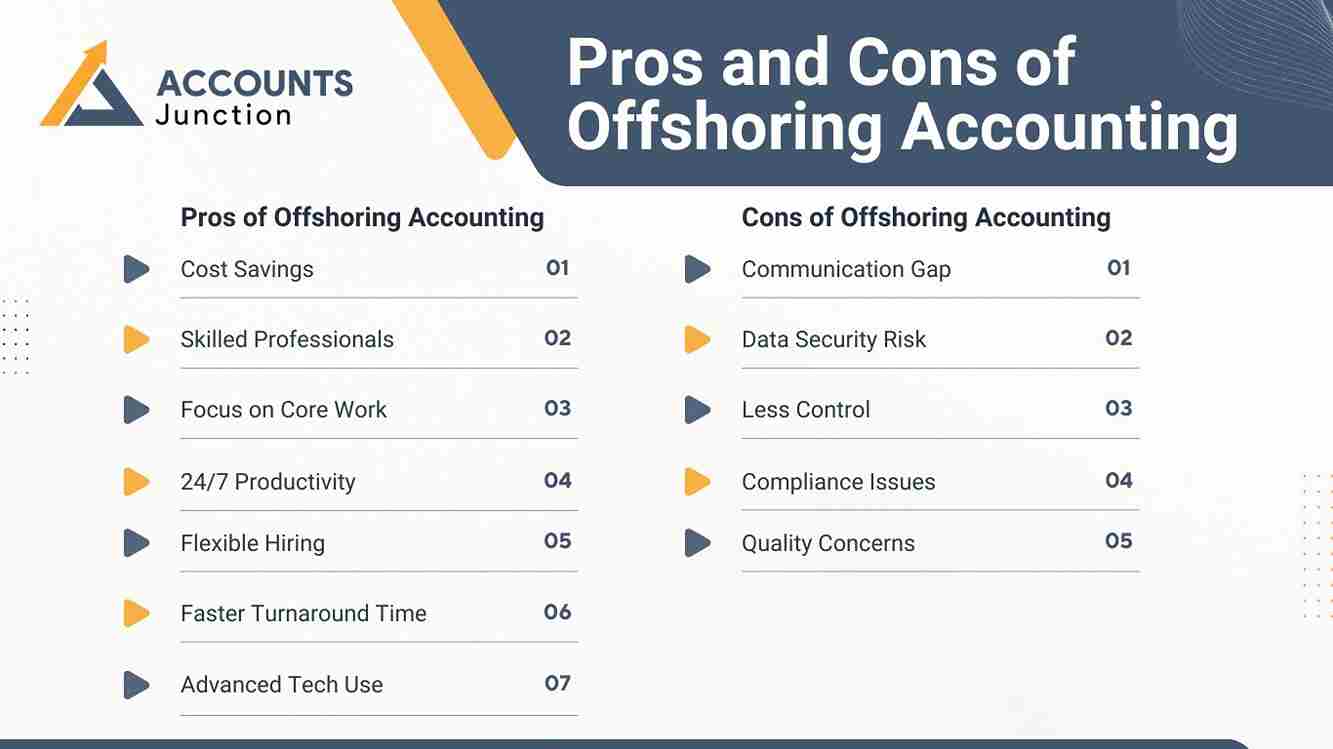
Is Offshoring Accounting Right for Your Business? Pros and Cons
Offshoring Accounting is a rising trend among small, mid-size, and large firms. By sending accounting work to skilled teams in other countries, businesses aim to save time, cut costs, and gain more flexibility. But Accounting Offshoring also brings some risk, like time zone gaps, data safety concerns, and less control over daily tasks.
As markets grow and shift, firms must stay lean, smart, and focused. Many are now choosing Accounting Offshoring to reduce strain, manage costs, and tap into a wider pool of talent. This model allows them to pass on tasks like bookkeeping, payroll, tax returns, and financial reports to offshore teams, often at a much lower rate than hiring local staff.
The cost edge is clear. In many offshore zones, labor is cheaper, yet the skill level remains high. Most offshore providers use smart tools and proven systems that help improve output and speed. Still, offshoring is not a one-size-fits-all move. There are things to weigh, such as how well your team can work with people in other time zones, and how safe your financial data will be. Some firms may also worry about tax rules and labor laws in the offshore location.
In this blog, we’ll explore both the pros and cons of Offshoring Accounting to help you decide if it fits your goals. With a clear view of both sides, you’ll be in a better place to choose what works best for your firm.
What is Offshoring Accounting?
Offshoring Accounting means hiring a team in another country to handle your financial work. This could include bookkeeping, payroll, tax filing, or audit prep. These tasks are done by trained staff who work for you from an offshore location.
Your offshore team may work full-time or part-time. Some firms use them for day-to-day jobs, while others use them during tax season or for project-based work. The goal is to get high-quality results at a lower cost, without adding stress to your local team.
Why Are Businesses Choosing Accounting Offshoring?
Accounting Offshoring is not just a cost-cutting move, it’s a smart growth plan. Here’s why more firms are saying yes to this model.
1. Save Money and Boost Profit
- Hiring in-house accountants can be costly. Offshore teams often offer the same skill set at a lower rate. You cut down on salary, hiring, training, and overhead costs.
2. Access Skilled Global Talent
- Offshore professionals are trained, certified, and skilled in global standards. They’re used to working with cloud tools and can handle complex tasks with ease.
3. Improve Focus on Core Work
- With offshore support, your local team spends less time on admin and more time on sales, service, and strategy. That leads to better use of time and talent.
4. Scale Faster with Less Risk
- Need to expand your team but not your office? Offshore hiring helps you scale up or down without long-term risk or fixed costs.
5. Use the Best Accounting Tools
Most offshore teams are trained in top tools like:
- QuickBooks
- Xero
- Zoho Books
- NetSuite
- Sage
They bring automation, reports, and smart dashboards, often more advanced than what small teams use locally.

Hire A Dedicated Team
That Grows With You, Flexible, Scalable and
Always On Your Side
Pros of Offshoring Accounting
1. Cost Savings
- Labor costs are lower in countries like India or the Philippines.
- You don’t need to pay for office space, tools, or benefits.
- Get expert work at a much lower cost.
2. Skilled Professionals
- Many offshore teams have years of experience.
- They know global standards and tax rules.
- Most are trained in QuickBooks, Xero, Zoho Books, and more.
3. Focus on Core Work
- You can give more time to sales, product, or client care.
- The offshore team handles the numbers while you grow the business.
4. 24/7 Productivity
- Time zone gaps can work in your favor.
- While you sleep, the offshore team works on your books.
- Next morning, your reports are ready.
5. Flexible Hiring
- Choose full-time or part-time help.
- Scale up or down as per your needs.
- No long-term contracts needed in most cases.
6. Faster Turnaround Time
- Offshore teams often work in shifts.
- This means faster report and file delivery.
- Monthly closings get done quicker.
7. Advanced Tech Use
- Offshore firms use top software tools.
- They manage your data safely in cloud-based apps.
- You get real-time updates on the work.
Cons of Offshoring Accounting
1. Communication Gap
- Time zone and language can slow down updates.
- It may take time to build good work flow.
- Misunderstandings may happen early on.
2. Data Security Risk
- You must share sensitive data.
- Some fear of leaks or misuse.
- Always choose firms with strong data policies.
3. Less Control
- The team is far from your main office.
- You can't walk over and ask something.
- You must trust the process and reports.
4. Compliance Issues
- Each country has different rules.
- Offshore teams may not know all local tax laws.
- Choose a firm that works with your country’s laws.
5. Quality Concerns
- Low price may mean poor work.
- Some offshore firms may not meet your quality level.
- You need to test before signing long-term deals.

Things to Check Before Offshoring Accounting
1. Experience of the Offshore Firm
- Check how many years they’ve been in the field.
- Ask for client references or case studies.
2. Data Safety Measures
- Look for ISO or GDPR compliance.
- Check if they use cloud tools with access control.
3. Communication Plan
- Set up regular meetings.
- Ask for a single point of contact.
4. Trial Period
- Ask for a trial project first.
- Review how they handle data, tasks, and reports.
5. Time Zone Management
- Choose a team that overlaps at least 2–3 hours with your time.
- This helps in real-time query solving.
Best Tasks for Accounting Offshoring
1. Bookkeeping
- Day-to-day records of cash, sales, and expenses.
2. Payroll Processing
- Timely and accurate salary, tax, and benefits handling.
3. Tax Filing Support
- Year-end reports, tax prep, and filing for local or global laws.
4. Accounts Payable and Receivable
- Managing due payments and follow-ups with clients or vendors.
5. Financial Reports
- Monthly or yearly reports like P&L, balance sheet, cash flow.
When to Avoid Offshoring Accounting
Offshoring Accounting can be a smart move for many, but not all. Some firms may be better off with in-house or local help. Below are cases where Accounting Offshoring may not be the right fit.
1. If You Need Face-to-Face Work
Some firms still prefer in-person talks and site visits.
If you meet your accountant often to review data, sign forms, or plan together, remote teams may not work well. Time zones and online tools can help, but they can’t match in-person talks.
Best for: Firms that want full access and local presence.
2. If You Handle Highly Private Data
Firms in law, defense, healthcare, or public work deal with strict rules.
In such fields, data safety is key. While offshore teams may use strong tools, some risks still remain when sharing sensitive information.
Best for: Firms with tight data rules or legal limits.
3. If Budget Is Not a Concern
Some firms can afford full in-house teams and don't need to cut costs.
In-house staff offer better control and faster talks, though they cost more. If saving is not your goal, offshoring may not give you much extra value.
Best for: Firms that want full control and have the budget.
4. If You Need Deep Local Knowledge
Tax rules, labor laws, and city codes change fast in some places.
If your work needs deep local insight, offshore teams may lack that depth, even if they know general tax norms.
Best for: Firms with complex local rules or filings.
5. If You Struggle with Tech or Talk
Offshoring means using tools like Zoom, Slack, and cloud systems.
If your team is new to such tech, or if talk is not smooth due to gaps in language or style, it can slow things down.
Best for: Teams that work best with face-to-face or paper-based work.
6. If You Need Fast, Real-Time Help
Some firms need input right away, same day or same hour.
Offshore teams may not be awake or free when you need them. Even if they work late, gaps in time can hurt speed.
Best for: Deals, audits, or talks that need quick support.
Tips to Make Offshoring Accounting Work for You
1. Set Clear KPIs
- Define timelines, report formats, and accuracy goals.
2. Train the Team
- Share guides, videos, or your SOPs.
3. Use Collaboration Tools
- Tools like Slack, Zoom, or Trello help a lot.
4. Review Often
- Have monthly check-ins.
- Give feedback and adjust tasks.
Is Offshoring Accounting Right for You?
Before you choose Offshoring Accounting, it’s smart to ask a few key questions. These help you check if the model fits your goals and your work style.
- Do I want to save money?
Offshoring can cut payroll and overhead costs. If budget matters, this is a big plus. - Can I work well with remote teams?
If your team can use cloud tools, email, and video calls, you’re set up for success. - Is my work process easy to train others on?
If your tasks are clear and repeatable, it’s easy to train offshore teams to take over. - Can I share data safely?
You’ll need to use secure tools and follow data rules when working across borders.
If you said “yes” to most of these, Accounting Offshoring may be a strong choice for your business.
Future of Accounting Offshoring
The world of Accounting Offshoring is growing fast, and the future looks bright. Here’s what to expect as the space evolves.
1. AI and Automation Will Make It Smoother
- Smart tools will speed up work like bank feeds, tax checks, and report making. This will cut time and reduce errors for offshore teams.
2. Hybrid Models Will Grow
- Many firms will blend local and offshore staff. Core work stays local, while offshore teams handle routine or high-volume tasks.
3. Data Tools Will Build Trust
- Cloud apps will help both sides work with real-time data. This will make talks smoother and give faster, clearer reports.
4. Global Talent Will Be Easier to Reach
- Hiring offshore will get easier with better platforms, remote work laws, and cross-border support systems.
5. More Focus on Security and Compliance
- As offshoring grows, firms will invest more in tools that keep data safe and meet rules across borders.
How to Build a Long-Term Offshore Accounting Team?
1. Start Small
- Begin with one or two tasks. Build trust. See how the team works before scaling up.
2. Build SOPs
- Share simple guides or videos for tasks. It helps the offshore team follow your way of doing things.
3. Use One Point of Contact
- Work with a single manager or lead from the offshore firm. It makes talks easy and smooth.
4. Offer Feedback
- Praise good work. Fix small mistakes early. Keep open chat lines.
Offshoring Accounting can give you great savings and expert help. But it also needs smart planning and good checks. With the right team and tools, Accounting Offshoring can be your smart edge in today’s market. Accounts Junction is a trusted name in Accounting Offshoring. With years of global experience, we help firms reduce costs and boost output. Our team is trained in top tools like Xero, QuickBooks, and Zoho Books. We ensure safe, fast, and expert service at every step.
FAQs
1. What is Offshoring Accounting?
- It is hiring an overseas team to handle your business accounts and finance tasks.
2. How is it different from outsourcing?
- Offshoring means work is done in another country; outsourcing can be local or global.
3. Is Offshoring Accounting safe?
- Yes, if you choose trusted firms with secure systems.
4. Can small firms use Accounting Offshoring?
- Yes. Even solo owners can benefit from lower costs.
5. What tools are used in Offshoring Accounting?
- Popular tools include QuickBooks, Xero, Zoho Books, and Excel.
6. What work can I offshore?
- Bookkeeping, payroll, tax filing, financial reporting, and more.
7. How do I choose the right offshore partner?
- Check their reviews, data policies, software use, and trial work.
